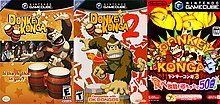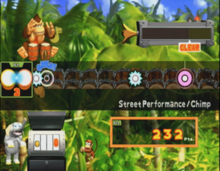Donkey Kong spin-off video game series
| This article needs additional citations for verification. Please help improve this article by adding citations to reliable sources. Unsourced material may be challenged and removed. Find sources: "Donkey Konga" – news · newspapers · books · scholar · JSTOR (May 2020) (Learn how and when to remove this message) |
| |
|---|---|
 North American cover art for Donkey Konga (left) and Donkey Konga 2 (center), and Japanese cover art for Donkey Konga 3 (right) North American cover art for Donkey Konga (left) and Donkey Konga 2 (center), and Japanese cover art for Donkey Konga 3 (right) | |
| Developer(s) | Namco |
| Publisher(s) | Nintendo |
| Director(s) | Hiroyuki Onoda |
| Producer(s) | Hiroshi Igarashi |
| Designer(s) | Hiromi Endo |
| Artist(s) | Naruhisa Kawano Toki Iida |
| Composer(s) | Junko Ozawa Jesahm |
| Series | Donkey Kong |
| Platform(s) | GameCube |
| Release | |
| Genre(s) | Rhythm |
| Mode(s) | Single-player, multiplayer |
Donkey Konga is a series of rhythm video games developed by Namco and published by Nintendo for the GameCube. A spin-off of the Donkey Kong series, they are played with a special controller called the DK Bongos that resemble two small bongo drums, but can optionally be played with the standard GameCube controllers.
Donkey Konga was developed by the team that were responsible for developing the Taiko no Tatsujin series. The tracks include songs such as "Louie Louie", "We Will Rock You", "Shining Star", "Rock Lobster", "Losing My Religion", and Hungarian Dance#5 in G Minor. There are tracks from the Mario series, The Legend of Zelda series, and other Nintendo related music. The Japanese, North American, and PAL region versions have different track lists, and in the North American version of the first two games, almost all of the licensed non-Nintendo/traditional songs are shortened covers. The first two games have around 30 tracks each, depending on the region, while Donkey Konga 3 has 58.
Plot

Donkey Kong and Diddy Kong are sitting on a beach one day when they come across some mysterious objects that resemble barrels. Fearing they had something to do with King K. Rool, they take them to Cranky Kong. Cranky explains that they are bongos, so Donkey tries playing them, as does Diddy. Then, when Donkey claps, the bongos start glowing. Cranky explains that the bongos have some kind of power inside them. Donkey and Diddy continue to play the bongos, but they both play terribly. Cranky advises them to practice. At first they are against this, but then they realize if they can become successful in playing the bongos, they could afford as many bananas as they wish, so they start practicing.
Sequels
Donkey Konga 2
Donkey Konga 2, marketed in Japan as "Donkey Konga 2: Hit Song Parade!", is the 2004 sequel to Donkey Konga for the Nintendo GameCube, a video game where the player must pound on a special, barrel-like controller called the DK Bongos along with a selected song.
The main selling point of Donkey Konga 2 is over 30 new tracks to play with Bongos. Other features include slightly improved graphics, the inclusion of some classic Donkey Kong characters and a variety of new minigames.
This is the only Donkey Kong game to be rated T for Teen in North America, as it contained lyrics not suitable for younger players. Other regions featured lyrics more appropriate for younger players and thus received lighter ratings.
Donkey Konga 3
Donkey Konga 3 is a music video game in the Donkey Kong series developed by Namco and published by Nintendo. Before the second installment was released in North America, Nintendo and Namco had already started plans for the third game in the series, which, unlike the first two Donkey Konga games, was eventually released only in Japan on March 17, 2005.
Donkey Konga 3 features a total of 57 tracks (none repeated from the previous games), over 20 tracks more than the first two games. 35 of these tunes are the usual classical, pop, and game selections, but an extra 21 tunes from Famicom games are included. It also features all new minigames.
Reception
Donkey Konga
Donkey Konga| Aggregator | Score |
|---|---|
| Metacritic | 76/100 |
| Publication | Score |
|---|---|
| Edge | 7/10 |
| Electronic Gaming Monthly | 7.5/10 |
| Eurogamer | 6/10 |
| Famitsu | 31/40 |
| Game Informer | 7/10 |
| GamePro | |
| GameRevolution | B |
| GameSpot | 7.5/10 |
| GameSpy | |
| IGN | 8.5/10 |
| Nintendo Life | |
| Nintendo Power | 4.2/5 |
| Maxim | 8/10 |
| The Sydney Morning Herald |
Donkey Konga received "generally favorable reviews" according to the review aggregation website Metacritic.
Maxim gave the game a score of eight out of ten and said that four bongos should be added "to create a frenzied, unholy din suitable for ritual virgin sacrifice". The Sydney Morning Herald gave it four stars out of five and wrote: "The beginner's level is a breeze, but Konga later becomes deliciously challenging, with hilarity-inducing flustered panic as you start to fall behind and surprising levels of concentration required to clap instead of drum. Hysteria soon prevails". The New York Times, however, gave it a mixed review and said: "Before you buy Konga, try clapping along with every song on the radio for half an hour and see how you feel at the end".
Donkey Konga won an award at the Game Developers Conference for the best "Innovation" in 2005. During the 8th Annual Interactive Achievement Awards, the Academy of Interactive Arts & Sciences awarded Donkey Konga for "Console Family Game of the Year", as well as received nominations for "Outstanding Innovation in Console Gaming", "Outstanding Achievement in Soundtrack", and "Outstanding Achievement in Gameplay Engineering".
Donkey Konga 2
Donkey Konga 2| Aggregator | Score |
|---|---|
| Metacritic | 69/100 |
| Publication | Score |
|---|---|
| Eurogamer | 5/10 |
| Game Informer | 7/10 |
| GameSpot | 6.9/10 |
| GameSpy | |
| GameTrailers | 8/10 |
| GameZone | 7.8/10 |
| IGN | 8/10 |
| Nintendo Power | 3.9/5 |
| Detroit Free Press |
Donkey Konga 2 received "average" reviews according to Metacritic.
Notes
- Japanese: ドンキーコンガ, Hepburn: Donkī Konga
- ドンキーコンガ2, Donkī Konga Tsū
- ドンキーコンガ3 食べ放題!春もぎたて50曲♪, Donkī Konga Surī: Tabe-houdai! Haru Mogitate 50 Kyoku, lit. Donkey Konga 3: All You Can Eat! Spring 50 Music Works Mix
References
- "Updated Australian Release List – 24/10/04". PALGN. October 24, 2004. Archived from the original on March 7, 2012. Retrieved July 7, 2014.
- ^ "Donkey Konga for GameCube Reviews". Metacritic. Archived from the original on November 9, 2023. Retrieved November 1, 2023.
- Edge staff (February 2004). "Donkey Konga". Edge. No. 133. p. 111.
- EGM Staff (November 2004). "Donkey Konga". Electronic Gaming Monthly. No. 184. p. 151.
- Bramwell, Tom (October 12, 2004). "Donkey Konga Review". Eurogamer. Archived from the original on March 30, 2014. Retrieved March 30, 2014.
- "ドンキーコンガ". Famitsu. Vol. 783. December 18, 2003.
- Helgeson, Matt (November 2004). "Donkey Konga". Game Informer. No. 139. p. 161. Archived from the original on February 8, 2005. Retrieved March 30, 2014.
- Test Monkey (November 2004). "Donkey Konga Review for GameCube on GamePro.com". GamePro. p. 106. Archived from the original on February 4, 2005. Retrieved March 30, 2014.
- Liu, Johnny (October 18, 2004). "Donkey Konga Review". Game Revolution. Archived from the original on March 30, 2014. Retrieved March 30, 2014.
- Davis, Ryan (September 27, 2004). "Donkey Konga Review". GameSpot. Archived from the original on March 30, 2016. Retrieved March 30, 2014.
- Theobald, Phil (September 24, 2004). "GameSpy: Donkey Konga". GameSpy. Archived from the original on October 10, 2013. Retrieved March 30, 2014.
- Castro, Juan (September 23, 2004). "Donkey Konga". IGN. Archived from the original on March 30, 2014. Retrieved March 30, 2014.
- Willington, Peter (July 16, 2011). "Donkey Konga (GameCube) Review". Nintendo Life. Archived from the original on March 30, 2014. Retrieved March 30, 2014.
- "Donkey Konga". Nintendo Power. Vol. 185. November 2004. p. 128.
- ^ Porter, Alex (September 27, 2004). "Donkey Konga". Maxim. Archived from the original on March 30, 2014. Retrieved March 30, 2014.
- ^ Hill, Jason (October 28, 2004). "Soccer sorcery". The Sydney Morning Herald. Archived from the original on June 4, 2016. Retrieved March 30, 2014.
- Herold, Charles (December 9, 2004). "New Breed of Games Is Not All Thumbs". The New York Times. Archived from the original on March 29, 2019. Retrieved March 30, 2014.
- "Game Developers Choice Online Awards 5th Annual GDCA". Game Choice Awards. Archived from the original on March 21, 2019. Retrieved December 8, 2010.
- "D.I.C.E. Awards By Video Game Details Donkey Konga". interactive.org. Academy of Interactive Arts & Sciences. Archived from the original on September 27, 2023. Retrieved September 18, 2023.
- ^ "Donkey Konga 2 Critic Reviews for GameCube". Metacritic. Archived from the original on December 14, 2023. Retrieved March 30, 2014.
- Bramwell, Tom (June 13, 2005). "Donkey Konga 2 Review". Eurogamer. Archived from the original on July 8, 2015. Retrieved March 30, 2014.
- "Donkey Konga 2". Game Informer. No. 147. July 2005. p. 121.
- Davis, Ryan (May 6, 2006). "Donkey Konga 2 Review". GameSpot. Archived from the original on October 15, 2018. Retrieved March 30, 2014.
- Vasconcellos, Eduardo (June 2, 2005). "GameSpy: Donkey Konga 2". GameSpy. Archived from the original on April 3, 2015. Retrieved March 30, 2014.
- "Donkey Konga 2, Review". GameTrailers. May 10, 2005. Archived from the original on June 29, 2006. Retrieved July 4, 2016.
- Watkins, Rob (July 4, 2005). "Donkey Konga 2 - GC - Review". GameZone. Archived from the original on May 19, 2009. Retrieved March 30, 2014.
- Castro, Juan (May 4, 2005). "Donkey Konga 2". IGN. Archived from the original on March 30, 2014. Retrieved March 30, 2014.
- "Donkey Konga 2". Nintendo Power. Vol. 192. June 2005. p. 97.
- Crumm, David; Crumm, Benjamin (May 29, 2005). "Donkey Konga 2". Detroit Free Press. Archived from the original on September 17, 2005. Retrieved March 30, 2014.
External links
- Donkey Konga at Nintendo.com (archives of the original at the Internet Archive)
- Nintendo Europe
- Donkey Konga at MobyGames
- Donkey Konga 2 at MobyGames
| Donkey Kong | |||||||
|---|---|---|---|---|---|---|---|
| List of video games | |||||||
| Main series |
| ||||||
| Spin-offs |
| ||||||
| Characters | |||||||
| Music | |||||||
| Television and film | |||||||
| Related |
| ||||||